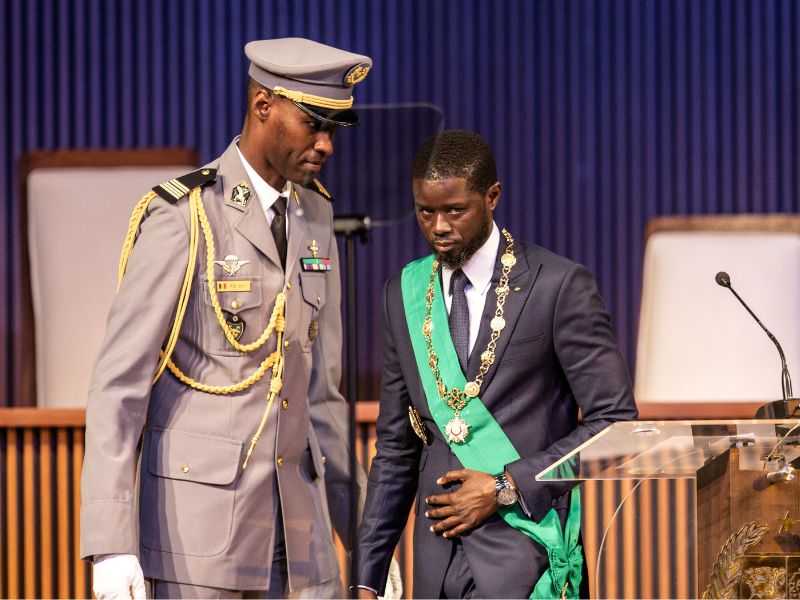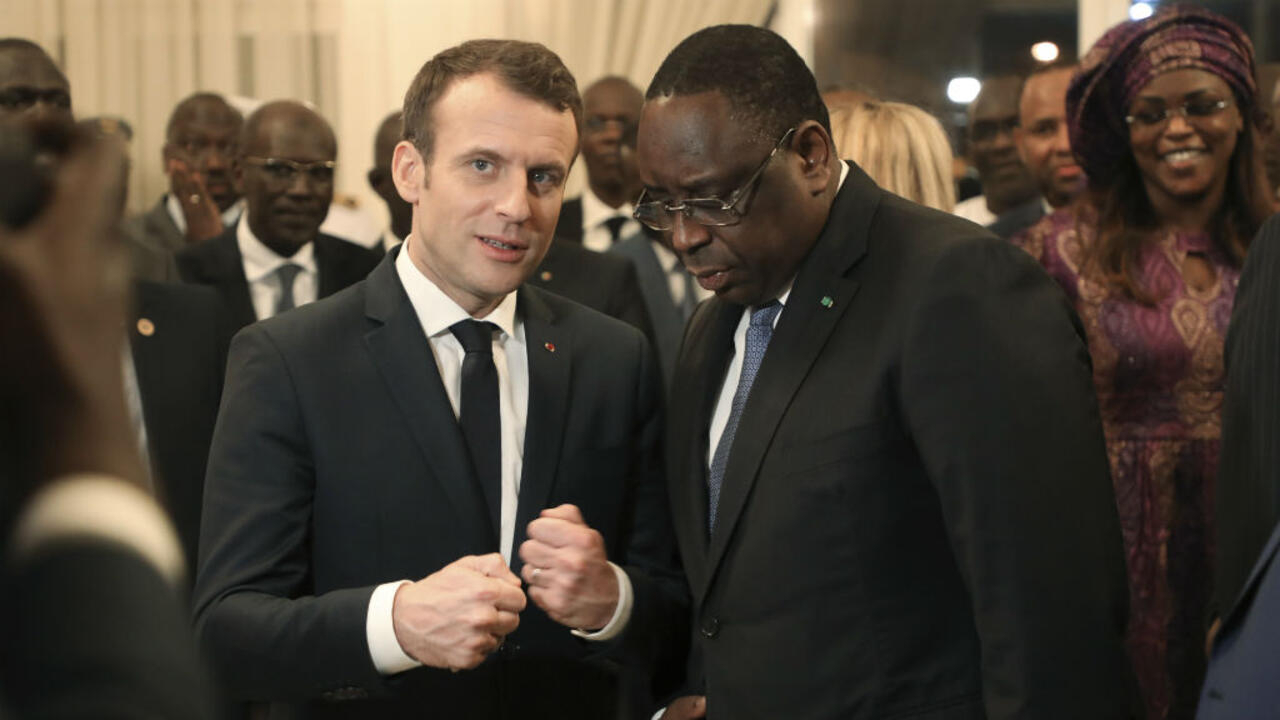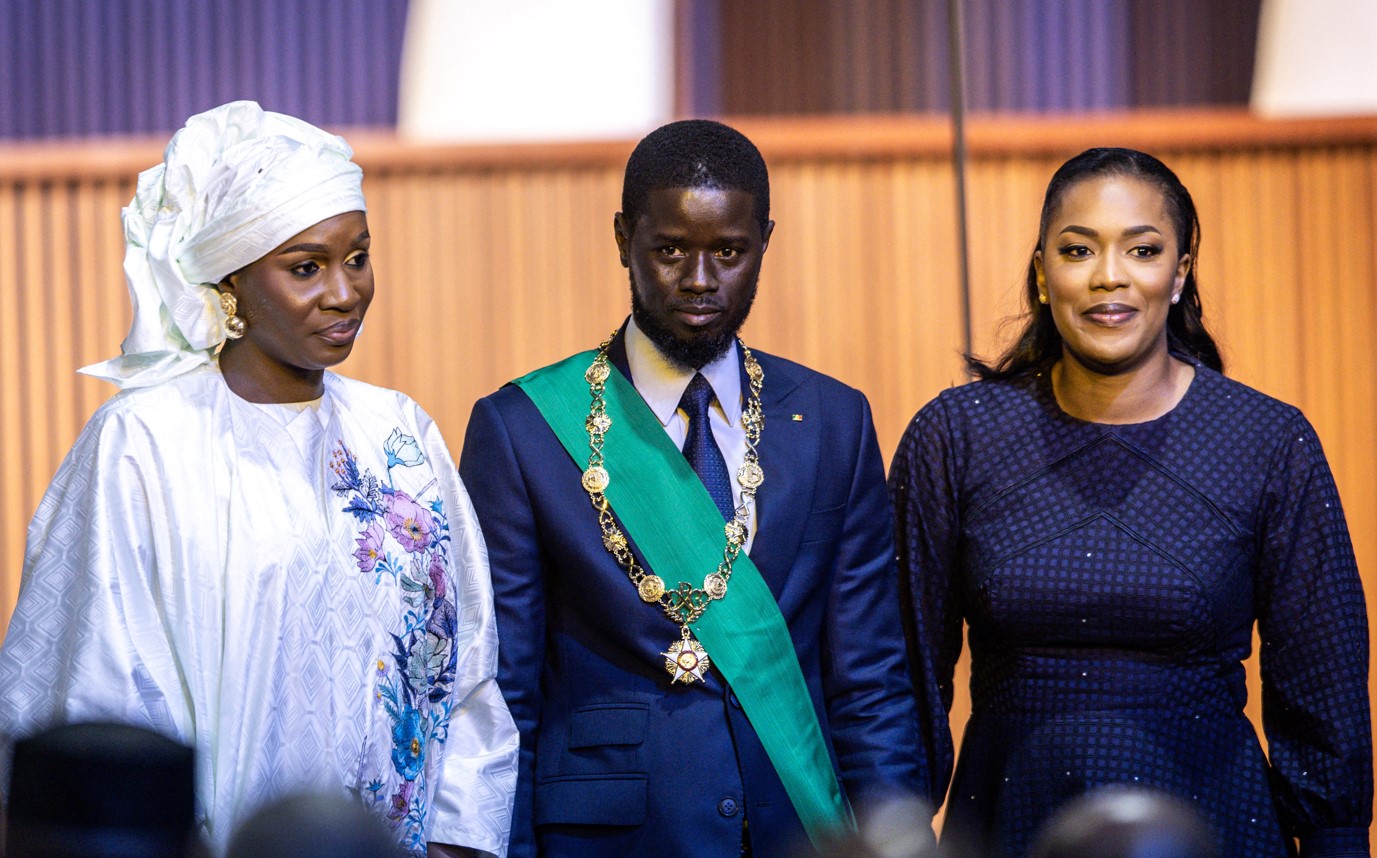Ruto, world leaders say ready to work with new Senegal President Bassirou Diomaye Faye

Kenyan President William Ruto has finally congratulated the Senegalese President, joining African and world leaders in the bid to strengthen relations.
Kenyan President William Ruto has finally congratulated Bassirou Diomaye Faye on his election as the Senegalese president taking over from Macky Sall, ending questions about why he was yet to, a week after the victory was affirmed.
No public statement had been issued by the State House or the Ministry of Foreign Affairs in Nairobi regarding the election or the inauguration ceremony that took place on Tuesday.
More To Read
- Kenya to tap into Senegal’s football success ahead of AFCON 2027 - Ruto
- Senegal’s President Bassirou Diomaye Faye honours Kenya’s freedom struggle
- Rwanda, Senegal sign deals as Kagame praises their shared vision for Africa
- Burkina Faso's military junta disbands electoral commission, calling it a waste of money
- French military ends permanent presence in Senegal
- What France loses by closing its military bases in Africa
Ruto's delayed message was curious, as Dakar is the sole francophone capital in West Africa, where Nairobi maintains a heavy diplomatic presence with a fully-fledged mission.
The simple action would signal that Nairobi understands the new and evolving political realities in West Africa and is committed to maintaining ties with the country.
A few hours after Faye's swearing-in, Ruto wrote this message on X:
Congratulations Bassirou Diomaye Faye on your decisive election victory. Your visionary leadership is inspiring and sets an unmatched example for emerging leaders. As you assume office today, we undertake to working with you to escalate Kenya-Senegal ties for our shared… pic.twitter.com/q9xXVIPVja
— William Samoei Ruto, PhD (@WilliamsRuto) April 2, 2024
Great expectations
Ruto, like these other leaders, is looking to partner with Faye and his country to strengthen relations and attain mutual benefit for the people.
He joined counterparts such as Rwanda's Paul Kagame, Tanzania's Samia Suluhu, Adama Barrow of The Gambia, French President Emmanuel Macron and China's Xi Jinping in stating these intentions.
Great expectations have come with 44-year-old Faye's election in a country seen as a bastion of stability in coup-hit West Africa but which has experienced unrest in the last few months.
The former tax collector's story is unusual. He was in prison alongside his opposition party leader, Ousmane Sonko, until March 14, when an amnesty saw Sall release them. Faye was arrested last April on allegations of defamation.
Following his release, he had a short campaign period, but his and his backers' efforts, Sonko in particular, proved successful and now, leaders in Africa and the world are keen on working with him.
In his message to Faye on March 27, Kagame tweeted, "My sincere congratulations to Bassirou Diomaye Faye on his election as President of Senegal. Your victory is a true testimony to the confidence of the Senegalese people, whom I congratulate for the peaceful conduct of the elections. I look forward to further strengthening the good relations between our two nations."
That same day, Tanzanian leader Samia Suluhu, also said she was "looking forward to continue to work together to strengthen the relations between Tanzania and Senegal".
She tweeted:
Other Topics To Read
- News
- Headlines
- World
- Africa
- National
- macky sall
- senegal president
- Bassirou Diomaye Faye
- senegal presidential elections
- Bassirou Diomaye Faye swearing in
- william ruto congratulates diomaye faye
- youngest african leaders
- Ruto
- world leaders say ready to work with new Senegal President Bassirou Diomaye Faye
I am conveying my sincere congratulations to His Excellency Bassirou Diomaye Faye, President-elect of the Republic of Senegal, on your victory in the 2024 Senegalese presidential election; and the Senegalese people for a peaceful election. You have my best wishes.
— Samia Suluhu (@SuluhuSamia) March 27, 2024
I am looking… pic.twitter.com/qA6Xr9MB23
Two days earlier, Adama Barrow, leader of The Gambia, wrote his congratulatory message on the same social media platforms:
I congratulate Mr. Bassirou Diomaye Faye for a victorious election & commend the People of the Rep. of #Senegal for the peaceful conduct of the election. I am optimistic that the cordial relationship between The #Gambia and Senegal will be further strengthened <President-Elect.
— President Barrow (@BarrowPresident) March 25, 2024
France, China and the US
In his message to the Senegalese president-elect, Macron also expressed his intention to work with him, even as its influence in West Africa continues to decline.
"I wish him every success and look forward to working with him," he wrote on X.
China's Foreign ministry Spokesperson Lin Jian sent a message on behalf of Beijing, noting a smooth, peaceful and orderly atmosphere, and describing the two nations as "good friends and brothers".
"China attaches great importance to the development of China-Senegal relations," Lin said, adding they were "willing to work together with the new government of Senegal to deepen political mutual trust, expand practical cooperation, and promote the continuous development of bilateral relations".
France has been facing uncertainty where relations with Africa are concerned, with its influence decreasing in 2023, a situation marked by developments such as tensions with its former colonies of Mali and Burkina Faso, in West Africa.
Both Mali and Burkina Faso, which have had coups that have seen military officers take over as leaders of transition governments, have ended their military aid deals with France.
The reasons for this declining influence include a changing global geopolitical landscape and competition from countries such as China, the United States, Russia, Turkey, and, most recently, Italy and Saudi Arabia.
The United States issued its message on March 27, saying the Senegalese people "demonstrated that the right to vote—and have that vote counted—remains democracy’s threshold liberty".
The White House further noted that for more than 60 years, Senegal and the United States have deepened their partnership, and collaborated in the fights against terrorism, food insecurity, the climate crisis, and corruption.
"In the years ahead, I look forward to strengthening these ties even further as we continue working together to forge a more peaceful and prosperous future for all," said the statement by US President Joe Biden.
He added that the two countries have also joined forces to ensure their citizens enjoy the fruits of democracy.
 French President Emmanuel Macron (L) speaks with Senegalese President Macky Sall (R) during a meeting in Dakar on February 2, 2018. (Photo: Ludovic Marin/AFP)
French President Emmanuel Macron (L) speaks with Senegalese President Macky Sall (R) during a meeting in Dakar on February 2, 2018. (Photo: Ludovic Marin/AFP)
AU, EU, and ECOWAS
Regional bodies, including the African Union (AU), the European Union (EU) and ECOWAS, also took early opportunities to congratulate Faye on his win.
Moussa Faki Mahamat, chair of the African Union Commission (AUC), issued a statement on March 29, wishing Faye "every success in his heavy and noble task of deepening a peaceful, stable and tolerant democracy in the service of inclusive, shared prosperity".
Mahamat welcomed the unanimous acceptance of the results of the presidential elections by the entire Senegalese political class.
"This dignified and responsible behaviour of all political and social actors attests to the deep roots of democratic traditions in this flagship country of African democracy," he said.
He added, "The President of the Commission, Moussa Faki Mahamat, assures President Diomaye Faye of the full solidarity of the African Union with the great Senegalese people."
Around 7.3 million Senegalese were eligible to take part in Sunday's vote, which registered a turnout of 61.3 per cent.
It was the first time in 12 presidential votes held under universal suffrage since Senegal gained independence from France in 1960 that an opposition candidate won in the first round of voting.
Senegal's electoral commission released the provisional presidential results on March 28, announcing that Faye had secured 54.28 per cent of the vote in the first round, against Amadou Ba's 35.79 per cent. Ba, Faye's main rival and government candidate, conceded defeat.
Observation missions deployed by the EU and the Economic Community of West African States (ECOWAS) praised the smooth running of the presidential election.
"Voting generally went smoothly and in a largely peaceful atmosphere," Ibrahim Gambari, head of the ECOWAS mission, told a press conference in the capital, Dakar.
At a separate press conference, the head of the EU mission, Malin Bjork, praised a "well-organised and open election that demonstrated the strength of Senegal's democratic institutions.".
"On the whole, the election was well organised. Voters were able to make their choice freely in a peaceful and orderly atmosphere," she added.
ECOWAS had deployed 130 observers and the EU another 100.
VIDEO: Bassirou Diomaye Faye is set to become Senegal's next president. He has pledged to bring about "national reconciliation" in the country that has experienced years of political turmoil. But the win could not have been possible without his right-hand man, Ousmane Sonko. pic.twitter.com/zjzaAXkVJ7
— AFP News Agency (@AFP) March 28, 2024
Youngest elected leader in Africa
A congratulatory message also came from Liberian ex-President George Weah, who noted on March 26 that Faye's victory made him one of the youngest leaders in Africa—an inspiration as, just a few weeks ago, he was relatively unknown in Senegalese politics.
Weah said Faye won the hearts of the Senegalese because of his "burning desire to see a change in the status quo".
"Considered by his people as a "modest" non-traditional politician, the former tax collector was driven by his ambition to help change the status quo," he wrote on X.
"Faye's story should serve as an inspiration to the continent's burgeoning youthful population; that with hard work and dedication, no dream is unrealisable and unattainable. His story reveals a growing reception across the African continent for leaders who are not from the establishment's political class. Faye's win is also a victory for democracy in Africa."
Further, Weah saluted Senegal's outgoing President Macky Sall, saying his "diligent stewardship navigated Senegal through turbulent winds to deliver free and fair elections" and that "his legacy as a champion of democracy and good governance will remain etched in the annals of history".
In his message to Faye as the vote count continued on Monday, Sall described the process as "smooth" and said the result was "the victory of Senegalese democracy."
Bassirou Diomaye Faye will become Senegal's youngest ever president after winning Sunday's vote on a ticket of systemic overhaul following years of deadly unrest, economic stagnation and political crisis https://t.co/CZrp38xTgE pic.twitter.com/IvGZV6xDmb
— AFP News Agency (@AFP) March 26, 2024
Faye, who has two wives and four children, is Africa's youngest elected leader.
The continent, seeking to break from the narrative of leaders who cling onto power for decades, has seen more young leaders—both elected and otherwise. Several are military officers who have come to power through coups.
Leaders on the continent who are aged below 50 include 36-year-old military officer Ibrahim Traoré (Burkina Faso), 39-year-old Mahamat Deby (Chad), and 41-year-old Assimi Goïta (Mali), a military leader who has been the interim president since the coup in 2021.
Others are 44-year-old Mamady Doumbouya (Guinea), 47-year-old Abiy Ahmed (Ethiopia, prime minister), and 49-year-old Andry Rajoelina (Madagascar). Ruto is 57 years old.
The continent's oldest leaders, some of whom have been in power for decades, include Paul Biya (91, Cameroon), Alassane Ouattara (82, Ivory Coast), Teodoro Nguema Mbasogo (81, Equatorial Guinea), Emmerson Mnangagwa (81, Zimbabwe), and Nana Akufo-Addo (79, Ghana).
Uganda's Yoweri Museveni is 78, Algeria's Abdelmadjid Tebboune is 77, newly-elected Nigerian President Bola Tinubu is 71, South Sudan's Salva Kiir is 72, and Rwanda's Paul Kagame is 66.
Kenya's second president, Daniel Arap Moi, died in 2020, aged 95, while Zimbabwe's Robert Mugabe was also 95 at the time of his death in 2019.
 Bassirou Diomaye Faye and his wives, Marie Khone Faye (L) and Absa Faye (R), pose for images after his swearing-in as Senegal's President at an exhibition centre in the new town of Diamniadio near the capital Dakar on April 2, 2024. (Photo: John Wessels/AFP)
Bassirou Diomaye Faye and his wives, Marie Khone Faye (L) and Absa Faye (R), pose for images after his swearing-in as Senegal's President at an exhibition centre in the new town of Diamniadio near the capital Dakar on April 2, 2024. (Photo: John Wessels/AFP)
Huge tasks ahead
Senegal now awaits the fulfilment of Faye's promises; he said he wants to govern with humility and transparency and fight the graft that continues to plague many African nations, inhibiting the delivery of campaign pledges.
Faye wants to prioritise national reconciliation, rebuilding institutions and significantly reducing the cost of living.
He has reassured foreign partners, saying his country will remain friendly and will be "a sure and reliable ally" for any that engage with it virtuously, respectfully and in a manner that secures mutual benefits.
Faye is also expected to stabilise the country, where dozens have been killed and hundreds arrested since 2021 in various episodes of unrest triggered partly by the standoff between the state and Sonko.
Sall's postponement of the presidential election, originally scheduled for February 25, 2024, plunged Senegal into its worst political crisis in decades and left four people dead.
Additional reporting by AFP
Top Stories Today













































